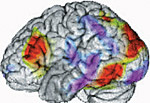Sign Aphasia Test Battery
 The overall objective of our research is to study the biological foundations of human language. Signed languages provide a powerful tool for investigating the nature of human language and language processing, the relation between cognition and language, and the neural organization for language. For perception, signed languages depend upon high-level vision and motion processing systems, and for production, they require the integration of motor systems involving the hands and face. These facts raise many questions: What impact does this different biological base have for grammatical systems? For the acquisition of language? How does it affect non-linguistic cognitive structures and processing? Are the same or different neural systems involved? Our laboratory investigates these issues by studying Deaf and hearing ASL signers.
The overall objective of our research is to study the biological foundations of human language. Signed languages provide a powerful tool for investigating the nature of human language and language processing, the relation between cognition and language, and the neural organization for language. For perception, signed languages depend upon high-level vision and motion processing systems, and for production, they require the integration of motor systems involving the hands and face. These facts raise many questions: What impact does this different biological base have for grammatical systems? For the acquisition of language? How does it affect non-linguistic cognitive structures and processing? Are the same or different neural systems involved? Our laboratory investigates these issues by studying Deaf and hearing ASL signers.
The Laboratory for Cognitive Neuroscience at The Salk Institute has been researching Sign Language Aphasia for more than 20 years. This project has included a core battery of tests that were developed from the 2nd Edition of the Boston Diagnostic Aphasia Examination (working with Harold Goodglass and Edith Kaplan) that we now call the SSAT (Salk Sign-language Aphasia Test), additional language probes (including sign language specific probes) and visuospatial tests. We are excited to show this battery to other researchers and clinicians. The menu of tests we have used can be found by clicking on each testing subsection (SSAT, Other ASL Language Probes and Nonlanguage Probes). Once there you can click on each link to see individual tests (if possible, some of the tests are copyrighted and thus you need to purchase them to get the actual tests), administration protocols (adapted into American Sign Language), rationale for adaptations to the test and video demonstrations.